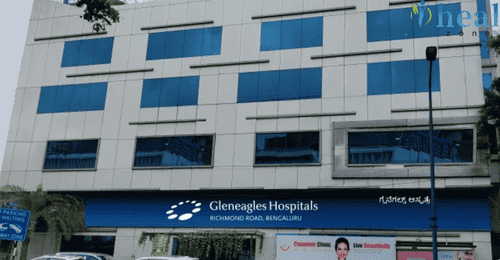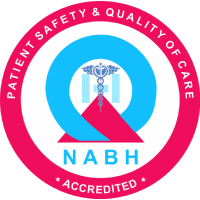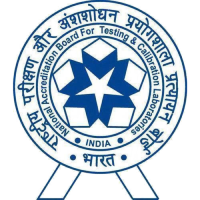Contact Us for Best Hepatology Hospitals in Bengaluru, India
Best Hepatology Hospitals in Bengaluru, India
Hepatology hospitals in India provide advanced treatment for liver, pancreas, and biliary system disorders under one roof. These hospitals are equipped with specialized liver units, high-end ICUs, and internationally accredited liver transplant programs. They manage conditions such as hepatitis, cirrhosis, fatty liver, liver cancer, and acute liver failure with cutting-edge therapies. With expert hepatologists, transplant surgeons, and multidisciplinary teams, these hospitals deliver outcomes comparable to top international centers. Their affordability, advanced labs, and patient-centered care attract patients globally.
Here are some of the Best Hepatology Hospitals in Bengaluru, India, recognized worldwide for excellence in liver care.
Gleneagles Hospital, Richmond, Bengaluru
5, 5, Richmond Rd, Shanthala Nagar, Ashok Nagar, Bengaluru, Karnataka 560025
26
Specialities
100
Beds Facility
0
ICU Beds
0
Established in
Gleneagles BGS Hospital, Bengaluru
Gleneagles BGS Hospital Kengeri, Bengaluru
26
Specialities
450
Beds Facility
0
ICU Beds
0
Established in
What makes the Best Hepatology Hospitals in Bengaluru, India unique?
The Best Hepatology Hospitals in Bengaluru, India combine expert teams with advanced infrastructure to deliver world-class liver care. They feature dedicated liver ICUs, advanced labs, and state-of-the-art transplant programs. Patients benefit from the availability of diagnostics, interventional procedures, and surgery under one roof.
What services do these hospitals provide?
Hepatology hospitals in India offer a full spectrum of services, including:
- Diagnostics such as elastography, MRCP, liver function tests, and biopsies.
- Medical management of hepatitis, cirrhosis, fatty liver, and portal hypertension.
- Endoscopic and interventional radiology procedures for biliary and vascular complications.
- Liver cancer care with targeted therapy, TACE, RFA, and systemic treatments.
- Liver transplant programs with high success rates and short waiting times.
- Preventive and lifestyle programs for alcohol-related and fatty liver disease.
Together, these services provide comprehensive and advanced liver care.
Why should international patients choose India for hepatology hospitals?
India has become a global hub for liver care because:
- Hospitals are accredited to international standards of safety and hygiene.
- Experienced hepatologists and transplant surgeons work in dedicated liver units.
- Costs are 70-80% lower than in Western countries.
- Waiting times for transplants are shorter compared to many nations.
- Patient support services simplify travel, visas, and accommodation.
This combination makes Indian hospitals attractive for overseas patients.
What is the success rate of liver treatment in Indian hospitals?
The Best Hepatology Hospitals in Bengaluru, India achieve outcomes that match global benchmarks:
- Hepatitis: excellent control with antivirals.
- Cirrhosis: delayed progression and improved survival with early care.
- Liver cancer: prolonged survival with modern therapies.
- Liver transplant: >90% one-year graft survival.
These outcomes demonstrate the quality and expertise of hepatology hospitals in India.
What is the cost of hepatology treatment in India for overseas patients?
International patients benefit from affordable, transparent pricing:
- Consultation: USD 40 - USD 60
- Liver function tests: USD 100 - USD 200
- Ultrasound with elastography: USD 200 - USD 400
- Liver biopsy: USD 500 - USD 900
- Endoscopic procedures: USD 1,200 - USD 2,500
- Cancer management (initial phase): USD 4,000 - USD 7,000
- Liver transplant: USD 28,000 - USD 35,000
- Hospital stay per day: USD 100 - USD 250
Compared to the West, these costs make advanced liver care far more accessible.
How long should patients plan to stay in India?
- Diagnostic evaluation: 3-5 days
- Endoscopic procedures: 7-10 days
- Cancer treatments: 2-4 weeks
- Liver transplant: 6-8 weeks, including rehabilitation
This ensures safe treatment and recovery.
Do these hospitals treat both adults and children?
Yes. Pediatric hepatology units manage congenital liver diseases, biliary atresia, and pediatric hepatitis with excellent outcomes.
Are the Best Hepatology Hospitals in Bengaluru, India equipped for emergencies?
Yes. With 24/7 emergency departments, these hospitals handle acute liver failure, gastrointestinal bleeding, and transplant complications safely.
What role does technology play in hepatology hospitals in India?
Technology drives outcomes. Hospitals use:
- High-end imaging like MRCP and elastography.
- Interventional radiology for minimally invasive procedures.
- Robotic-assisted surgery for complex cases.
- Advanced labs for genetic and viral testing.
Together, these tools enhance precision and safety.
Can patients consult these hospitals online before traveling?
Yes. Patients can share medical history and test results with HealZone. The Best Hepatology Hospitals in Bengaluru, India provide teleconsultations, second opinions, and cost estimates in advance.
What about follow-up after discharge?
Follow-up includes lab tests, imaging, and medication monitoring. Patients who undergo liver transplant receive structured online follow-up care.
What do overseas patients say about hepatology hospitals in India?
Patients from around the world highlight affordability, expert teams, and compassionate care. Many appreciate shorter waiting times and comprehensive transplant programs.
Will choosing the Best Hepatology Hospitals in Bengaluru, India improve my quality of life?
Yes. With expert hepatologists, advanced infrastructure, and affordable care, hepatology hospitals in India help patients recover from liver disease, regain strength, and live healthier lives.




